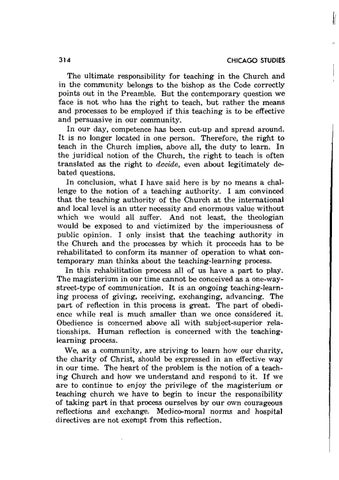li
314
CHICAGO STUDIES
The ultimate responsibility for teaching in the Church and in the community belongs to the bishop as the Code correctly points out in the Preamble. But the contemporary question we face is not who has the right to teach, but rather the means and processes to be employed if this teaching is to be effective and persuasive in our community. In our day, competence has been cut-up and spread around. It is no longer located in one person. Therefore, the right to teach in the Church implies, above all, the duty to learn. In the juridical notion of the Church, the right to teach is often translated as the right to decUle, even about legitimately debated questions. In conclusion, what I have said here is by no means a challenge to the notion of a teaching authority. I am convinced that the teaching authority of the Church at the international and local level is an utter necessity and enormous value without which we would all suffer. And not least, the theologian would be exposed to and victimized by the imperiousness of public opinion. I only insist that the teaching authority in the Church and the processes by which it proceeds has to be rehabilitated to conform its manner of operation to what contemporary man thinks about the teaching-learning process. In this rehabilitation process all of us have a part to play. The magisterium in our time cannot be conceived as a one-waystreet-type of communication. It is an ongoing teaching-learning process of giving, receiving, exchanging, advancing. The part of reflection in this process is great. The part of obedience while real is much smaller than we once considered it. Obedience is concerned above all with subject-superior relationships. Human reflection is concerned with the teachinglearning process. We, as a community, are striving to learn how our charity, the charity of Christ, should be expressed in an effective way in our time. The heart of the problem is the notion of a teaching Church and how we understand and respond to. it. If we are to continue to enjoy the privilege of the magisterium or teaching church we have to begin to incur the responsibility of taking part in that process ourselves by our own courageous reflections and exchange. Medico-moral norms and hospital directives are not exempt from this reflection.
